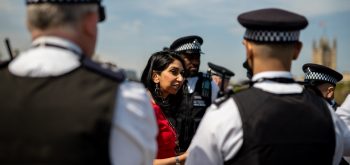The policing watchdog has said forces need to do more to minimise harm when undertaking stop and searches, and to better understand the harm caused by these powers.
His Majesty’s Inspectorate of Constabulary have released a report following an investigation by three oversight bodies into the way that police use Section 60 stop and searches. They found in many cases police officers weren’t being trained effectively in using these powers and police chiefs couldn’t explain the harm that they can cause within communities. It also found ‘concerning’ examples of police not effectively using body-worn cameras while conducting searches.
The report was released in response to a super-complaint by the Criminal Justice Alliance, a network of 170 organisations, made in 2021. They found disproportionate implementation of stop and searches under Section 60 of the Criminal Justice and Public Order Act, which allow police to search anyone within a certain area with no reasonable grounds. Their statistics showed that black people are 18 times more likely to be stopped and searched under Section 60 compared to white people and 9 times more likely under a standard stop and search.
The Justice Gap has previously reported the findings of the Runnymede Trust which said that black people are not only stopped and searched more, but also experience a higher degree of force used.
HMIC’s report found that police chiefs were unable to explain the disproportionate use of this power on black people. The body have also advised forces to be wary of the long-term effects this can have on those having been stopped and searched. The findings revealed that stop and search, including under section 60, can be an ‘embarrassing, intrusive and frightening experience for the person involved.’
They said that although safeguards exist, they are not being followed. It was also noted that in some cases when section 60 was utilised, those searched were handcuffed unnecessarily.
Abimbola Johnson, Barrister at Doughty Street Chambers and Chair of the Independent Scrutiny and Oversight Board for the Police Race Action Plan said: ‘Section 60 should be used more sparingly. If Section 60 is going to be used, there needs to be more investment in community engagement before authorising these coercive powers too quickly and too frequently. There are times that arrests are made and weapons seized but there is no data that measures effectiveness.’
Assistant Chief Constable (retired) Jaquie Sebire, NPCC Lead for Serious Youth Violence said: ‘There hasn’t been a robust, evidenced based, and data driven study or randomised control [trial] to determine whether section 60 works in preventing serious violence. Neither has a trial compared this with the impact section 60 has on communities.’
In a statement accompanying the report the Lead Inspector of Constabulary, Wendy Williams, said: ‘We know that, when used properly, section 60 stop and search can support the police response to serious violence. However, the use of the power can have detrimental effects on public trust and confidence in the police, particularly among Black communities.
It’s vital that forces understand the importance of using section 60 stop and search legitimately, proportionately and fairly. We found this was often the case, but we also saw a range of shortcomings. And these often mirrored the Criminal Justice Alliance’s concerns.’






